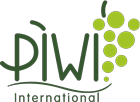DLR Rheinpfalz, Institute for Viticulture and Oenology, Marc Weber, Prof. Dr. Ulrich Fischer German Wine Institute, Ole Kohlmann
On the occasion of the 74th Viticulture Days 2021
Actually, they all have trumps in their hands, the mushroom-resistant grape varieties, or PIWIs for short. It has been proven that significantly reduced plant protection is required in order to harvest ripe and healthy grapes, reduced crossings protect the soil structure and lower workload and costs for plant protection, be it ecological or conventional, save the winemaker's budget. So it is surprising why in the Palatinate only 3.2 % of the vineyard area is planted with PIWIs, of which the regent alone denies 2.2%. In Rhineland-Palatinate, there are only 2.9% of the vineyard area, which is surprising, because they are predestined for steep and terraced locations where crop protection is more labor-intensive and cost-intensive. If you ask the winemakers about their reluctance to plant PIWIs, they complain about a lack of interest on the part of consumers and trading companies, while the wineries and consumers complain about a limited supply. In order to resolve this contradiction, a sub-area of the nationwide VITIFIT project of the Federal Ministry of Agriculture is concerned with improving the style of the wines made from PIWI grape varieties and their chances of success in marketing.
Conclusion: In terms of their quality potential, wines made from PiWi grape varieties are on par with the standard grape varieties. However, there is still a lack of experience as to how they can best be expanded. Consumer preferences and the derived preferred or rejected sensory attributes help here. For the future, the question arises whether PIWI wines should be good sensory “copies” of the styles of the standard grape varieties or whether they should show an independent, different, but recognizable profile as new and different.

